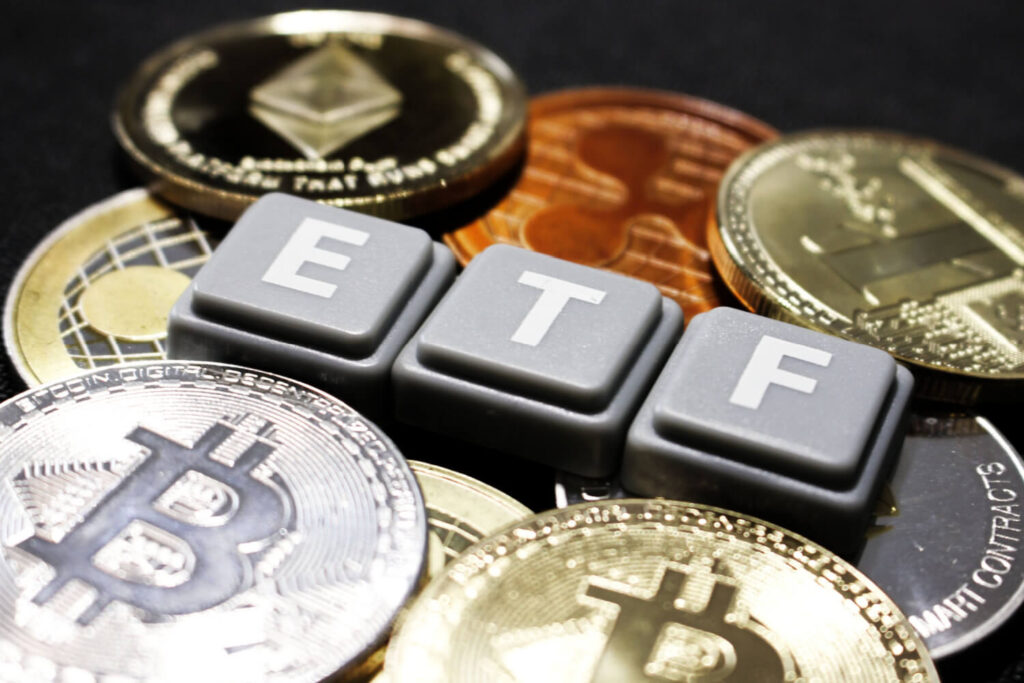
Spot Ethereum ETFs Are Filed as 30-Day ETH Supply Turns Inflationary
The financial titans ARK Investment Management and Swiss fintech firm 21Shares have teamed up to file for Spot Ethereum ETFs, aiming to broaden access beyond Bitcoin and pioneer innovative investment avenues.
Meanwhile, Ethereum finds itself navigating uncharted waters as on-chain activity takes a hit during a notably quiet crypto summer, leading to an unexpected inflationary turn.
Finally, traditional stock exchanges, including the London Stock Exchange Group, are exploring ways to integrate cryptocurrencies into their platforms, despite the regulatory challenges and reputational concerns that continue to loom.
- Spot Ethereum ETFs are filed by financial titans
- Ether’s inflationary turn as quiet summer causes on-chain activity dip
- Traditional stock exchange paves the way for blockchain integration
Spot Ethereum ETFs are filed by financial titans
Teaming up with Swiss fintech firm 21Shares, ARK Investment Management has submitted an application to the Securities and Exchange Commission (SEC) for the launch of an exchange-traded fund (ETF) dedicated to Ethereum (ETH), the second-largest cryptocurrency by market capitalization, following Bitcoin.
The joint initiative, announced by the submitted filing, reflects a shared vision between ARK and 21Shares to broaden access and exposure to crypto-backed assets beyond Bitcoin.
The cryptocurrency market is rapidly evolving, and these industry players are committed to pioneering innovative, regulated investment vehicles that facilitate convenient access to Ethereum for investors.
However, ARK Investment Management was not alone in its pursuit of an Ethereum ETF.
VanEck, a prominent investment manager, also joined the race last week to launch an ETF focused on the second-largest cryptocurrency.
These developments come on the heels of Grayscale Investments’ successful appeal against an SEC decision that initially denied its bid to launch the first spot Bitcoin ETFs in the United States.
A panel of federal judges ruled that the SEC had acted arbitrarily and capriciously in its rejection, especially given its prior approval of ETFs holding Bitcoin futures contracts, such as the ProShares Bitcoin Strategy (BITO) ETF.
The SEC now faces a decision, expected by mid-October, regarding whether to challenge this ruling or find alternative paths to bring the Bitcoin ETF to market.
In August, several fund management firms also sought approval for funds focused on Ether futures, with potential approval anticipated as early as October.
The anticipation surrounding new Spot Ethereum ETFs briefly triggered a surge in the price of Ether last week, pushing it up by more than 10%. However, following the announcements from ARK Invest-21Shares and VanEck, Ether’s price has stabilized around the $1,630 mark.
While the surge in cryptocurrency ETF applications has sparked optimism regarding easier access for financial advisors and institutional investors, the SEC retains the option to delay its final decision on the Ether fund applications multiple times.
The ultimate deadline will likely fall in May of the following year. As of now, the commission has not provided any official comments on the matter.

Ether’s inflationary turn as quiet summer causes on-chain activity dip
Ethereum is grappling with a significant shift in dynamics as on-chain activity has dipped during a particularly quiet crypto summer. The dip in on-chain activity has ushered in an unexpected inflationary period.
Bit Info Charts’ data indicates that Ethereum users have seen transaction fees plummet to levels last witnessed in January.
Simple token transfers are currently costing users less than $2.60, with an average gas fee of just 9 gwei, marking a considerable departure from the soaring fees seen during the height of the DeFi boom.
This downturn in on-chain activity closely aligns with the deepening slump in the NFT market, which had been a driving force behind Ethereum’s popularity.
According to DappRadar, the combined monthly trading volume of NFTs across all networks has witnessed a staggering 70% drop since March, now sitting at $559 million.
Likewise, DEXes recorded their lowest monthly trading volumes since December 2020 in August, as reported by The Block.
All of this combined has had a profound impact on Ethereum’s burn rate.
The Ethereum network introduced a burning mechanism with the activation of EIP-1559 in August 2021, aiming to reduce the total supply of Ether.
This mechanism permanently removed ETH from circulation by utilizing it as base transaction fees. Following the transition to Proof of Stake in September last year, Ethereum’s issuance rate had dwindled by approximately 90%, leading to expectations of a steady reduction in the circulating supply.
From a peak of 120.53 million ETH in October 2022, the supply had gradually decreased to 120.43 million by the end of April. The burn rate had surged during the frenzy of DEX-based memecoin trading, incinerating a whopping 182,600 ETH, which accounted for 60% of all Ether destroyed, between April 18 and June 1.
However, Ethereum’s ecosystem has hit a plateau in recent months, bringing about a surprising reversal in Ether’s supply trend.
According to data from Ultra Sound Money, over the last 30 days, 65,522 ETH have been issued in comparison to 63,520 ETH that have been burned, which has turned ETH’s supply inflationary once again.
Traditional stock exchanges pave the way for crypto integration
The London Stock Exchange Group (LSEG.U.K.) has officially confirmed that it is actively exploring the development of a comprehensive digital market designed to streamline capital raising and transfer processes.
According to an interview with the Financial Times, the exploration has been ongoing for approximately a year, and the exchange has now reached a pivotal point where it intends to proceed.
However, the LSE is not alone in this endeavor.
The Intercontinental Exchange (ICE), the operator of the New York Stock Exchange, ventured into the crypto space by spinning off Bakkt (BKKT) as its subsidiary in 2021.
Bakkt primarily focuses on crypto custody solutions but has also ventured into tokenization through partnerships with Mastercard (MA) to offer tokenized rewards and loyalty points. In April of the same year, ICE also acquired Apex, a cryptocurrency exchange.
Patrick Moley, an analyst at Piper Sandler, noted that ICE CEO Jeffrey Sprecher has always acknowledged the potential in the crypto space but has been cautious about associating the ICE name directly with crypto.
This cautious approach reflects the regulatory challenges and reputational concerns surrounding cryptocurrencies in the United States.
Regulatory ambiguity remains a significant hurdle for traditional exchanges looking to integrate with the crypto industry. While they recognize the revenue potential of blockchain technology and tokenization, concerns persist regarding the crypto market’s volatile reputation.
“Exchanges are waiting for more regulatory clarity,” says Moley.
Nevertheless, these exchanges are steadily moving forward.
Nasdaq (NDAQ), for instance, is seeking approval to list a Bitcoin exchange-traded fund sponsored by BlackRock, provided regulatory authorities grant their consent. Nasdaq has also explored crypto custody services and expanded its presence in digital assets through partnerships, such as providing the matching engine for the Bitstamp crypto exchange.
Likewise, Cboe Global Markets (CBOE), a major player in Chicago, currently has six pending applications to host such a fund.
“Exchanges have the technological capability to establish the infrastructure necessary for asset tokenization and trading. However, without regulatory clarity surrounding digital assets, the meaningful adoption of tokenized assets may remain elusive,” emphasizes Moley.
As traditional stock exchanges continue to explore opportunities in the cryptocurrency industry, they face a complex landscape of regulatory challenges and market evolution. Nonetheless, their interest in digital assets reflects the growing significance of cryptocurrencies in the broader financial ecosystem.
To stay up to date on all things crypto, like Xcoins on Facebook, and follow us on Twitter, Instagram, and LinkedIn.

